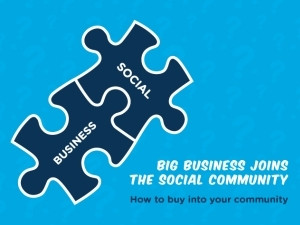Johannesburg, 08 Aug 2014

In June, we discussed the issues surrounding the education of maths and science in South Africa, but there is a new trend for businesses to buy into their community's future, so let's take a deeper look at the education situation in this country a decade or so down the line.
Those who rule money, rule the world is a common idiom, and not nearly as pessimistic as it may seem. The perception of business is changing, and has been for a decade at least. People are thinking about big business less in terms of a malignant curse out to ruin our health and our planet, and more in terms of a resource for social improvement. A simple scale is 20:1, where business revenue is 20 times that of NGO revenue. People are taking notice of this disparity, and more importantly, big business is sitting up and seeing there is a real difference to be made.
The Baby Boomer mentality of "take, make, and waste" is quickly becoming unfashionable and is being called out as immoral. Sadly, companies like that still exist, but the growing trend is business actively seeking social responsibility initiatives. Today, many businesses have taken it upon themselves to act as partners of social change and upliftment.
Shared value = social investment + economic growth
Michael Porter explains (in his 2013 TED talk Why business can be good at solving social problems) that it is all about changing perception. Industries can help socially by changing the way in which they view themselves - adjusting the scale in which they view company growth (long-term growth versus quick profits).
Conventional wisdom decrees that meeting social needs conflicts with maximising profits; however, belief in shared value shows how shifting our view to a more long-term vision is the key to long-term success that benefits both industry and aids social growth. Shared value equals economic growth plus social benefit, and over time, businesses will be able to enjoy the economic benefits of a socially aided community. This is the winning combination that more companies are moving toward.
Training children now for potential employees later
So, what can be done to aid this long-term vision? This year's Global Information and Technology Report explains that countries showing business initiative in developing ICT can expect better results of the overall well-being of the state. With the incorporation of ICT development as a framework of industry, societies "will be more likely to benefit from a push on the part of the different stakeholders, allowing for more benefits".
ICT is the conductor of education today; to be without access is to be left behind in a global tech race where change is the only constant. Sixteen June was a little over a month ago, and let us not forget the reason we commemorate it. Two things have changed the nature of this country since 1976; the ending of apartheid, and the introduction and spread of information and communication through the Internet.
In a South African context, Porter's socially aided community could well be harvested through education. By spreading responsibility across government, NGOs as well as business, social needs can be met with greater resources and at a faster pace. Heartening is the fact that some businesses are actively entering communities with initiatives that promote education and shared value as an industry responsibility, including Microsoft SA, Google SA, and Neotel.
Ray Anderson says: "Unless somebody leads, nobody will. It's axiomatic."
Berating the government is all too easy. More businesses should strive to be leaders in education, working closely with policy makers to ensure that today's grade ones will enter a global job market where their skills are both valid and valued when they matriculate in 2026.
References:
3 June 2014. BBC News Africa. http://www.bbc.com/news/world-africa-27683189
8 November 2013. ITWeb. http://www.itweb.co.za/index.php?option=com_content&view=article&id=68839:White-spaces-trial-wraps-up&catid=147
20 June 2014. My Broadband. http://mybroadband.co.za/news/broadband/104579-free-internet-for-everyone-in-western-cape-zille.html
Anderson, R. February 2009. TEDGlobal
http://www.ted.com/talks/ray_anderson_on_the_business_logic_of_sustainability#t-122820
Be~nat Bilbao-Osorio, Soumitra Dutta, and Bruno Lanvin (eds.) 2014. Cornell University. http://www3.weforum.org/docs/WEF_GlobalInformationTechnology_Report_2014.pdf
Khayelitsha Christian Academy
http://www.khayelitsha-academy.org/friends.php
Mawson, N. 10 January 2014. ITWeb. http://www.itweb.co.za/index.php?option=com_content&view=article&id=69986:Alarm-bells-for-ICT-skills-pool
Mawson, N. 18 June 2014. ITWeb. http://www.itweb.co.za/index.php?option=com_content&view=article&id=135430
Michael Porter. June 2013. TEDGlobal http://www.ted.com/talks/michael_porter_why_business_can_be_good_at_solving_social_problems
Vermeulen, J. 24 October 2013. My Broadband
http://mybroadband.co.za/news/columns/90113-why-only-delphi-java-and-vb-for-sa-schools.html
Vermeulen, J. 13 December 2013. My Broadband http://mybroadband.co.za/news/government/93659-delphi-ms-office-sa-schools-exclusive-reversed.html